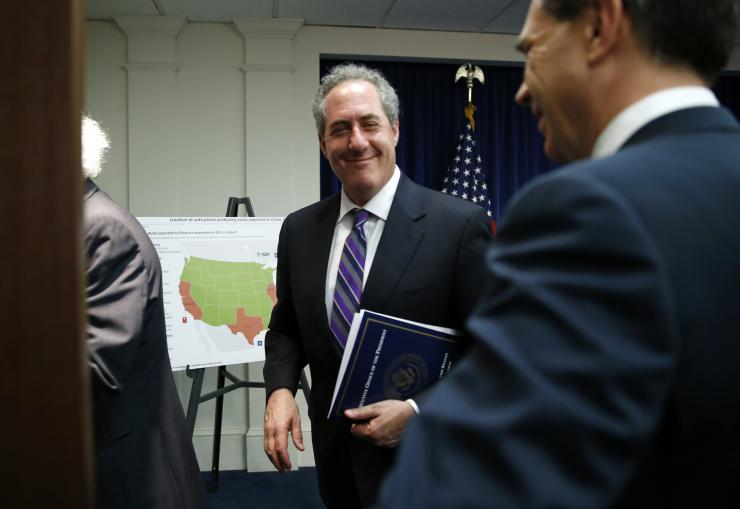Trans-Pacific Partnership: Leaked Trade Deal Draft Shows Big Pharma’s Sway
TRADE, 6 Jul 2015
Owen Davis – International Business Times

U.S. Trade Representative Ambassador Michael Froman has pushed for the passage of the Trans-Pacific Partnership, which pharmaceutical companies say would increase drug sales. Reuters/Kevin Lamarque
1 Jul 2015 – The Obama administration has lauded the 12-nation Trans-Pacific Partnership (TPP) as the most progressive trade deal in history. But a recently leaked chapter of the draft deal, obtained by Politico, reportedly shows a U.S. negotiating team devoted to protecting pharmaceutical industry profits at the expense of cheaper generic drugs in the 12 countries affected.
The provisions pushed by American trade representatives in the May version of the TPP’s intellectual property chapter included measures that would strengthen patent protections across borders, Politico reports. Known as patent linkage, these rules prevent a country from approving cheaper generic drugs if a patent-holder has filed a legal challenge in a member state.
Consumer advocates argue that patent linkage makes it harder for generic drug companies to operate abroad, meaning steeper health costs for the 800 million inhabitants of TPP countries. “It would create higher drug prices around the world,” Doctors Without Borders director of policy Rohat Malpini told Politico. “And in the U.S. too.”
The Generic Pharmaceutical Association, a trade group, has estimated that using generic drugs in lieu of their brand-name competitors has saved Americans $1.5 trillion over the last decade.
The TPP has stirred heated political debate over the past several months. President Obama waged an ultimately successful battle to lay the legislative groundwork for the deal’s passage, raising the hackles of progressive politicians like Sen. Elizabeth Warren, D.-Mass. Like most trade deals, the draft text of the TPP is not publicly available, though a steady stream of leaks has trickled out of the negotiationg room.
Covering a dozen Pacific-rim nations with a combined 40 percent of world GDP, the TPP would represent one of the largest trade deals in history. Proponents say the TPP would expand trade between the U.S. and the other member states while enhancing environmental and labor protections.
In particular, the pharmaceutical industry has argued that the patent-protection measures of the TPP would enable companies to continue making multi-billion-dollar investments in new drugs. PhRMA, the lobbying arm of the pharmaceutical industry, has emerged as one of the top supporters of the TPP and similar deals.
That lobbying has paid off. Patient advocates contend that the U.S. negotiators have fought primarily for the interests of the drug lobby in TPP negotiations. In a letter last year, representatives 11 organizations including the AARP and the Medicare Rights Center argued that the deal “puts too much emphasis on drug industry priorities, and does not give equal weight to consumer priorities such as prescription drug affordability, safety, efficacy, and cost-effectiveness.”
The leaked chapter is not final, however, as provisions are likely to evolve as TPP negotiations reach their conclusion.
DISCLAIMER: The statements, views and opinions expressed in pieces republished here are solely those of the authors and do not necessarily represent those of TMS. In accordance with title 17 U.S.C. section 107, this material is distributed without profit to those who have expressed a prior interest in receiving the included information for research and educational purposes. TMS has no affiliation whatsoever with the originator of this article nor is TMS endorsed or sponsored by the originator. “GO TO ORIGINAL” links are provided as a convenience to our readers and allow for verification of authenticity. However, as originating pages are often updated by their originating host sites, the versions posted may not match the versions our readers view when clicking the “GO TO ORIGINAL” links. This site contains copyrighted material the use of which has not always been specifically authorized by the copyright owner. We are making such material available in our efforts to advance understanding of environmental, political, human rights, economic, democracy, scientific, and social justice issues, etc. We believe this constitutes a ‘fair use’ of any such copyrighted material as provided for in section 107 of the US Copyright Law. In accordance with Title 17 U.S.C. Section 107, the material on this site is distributed without profit to those who have expressed a prior interest in receiving the included information for research and educational purposes. For more information go to: http://www.law.cornell.edu/uscode/17/107.shtml. If you wish to use copyrighted material from this site for purposes of your own that go beyond ‘fair use’, you must obtain permission from the copyright owner.